- Home
- Herman Melville
Billy Budd Page 2
Billy Budd Read online
Page 2
"God knows, Sir."
Struck by the straightforward simplicity of these replies, the officer next asked, "Do you know anything about your beginning?"
"No, Sir. But I have heard that I was found in a pretty silklined basket hanging one morning from the knocker of a good man's door in Bristol."
"Found say you? Well," throwing back his head and looking up and down the new recruit; "Well, it turns out to have been a pretty good find. Hope they'll find some more like you, my man; the fleet sadly needs them."
Yes, Billy Budd was a foundling, a presumable by-blow, and, evidently, no ignoble one. Noble descent was as evident in him as in a blood horse.
For the rest, with little or no sharpness of faculty or any trace of the wisdom of the serpent, nor yet quite a dove, he possessed that kind and degree of intelligence going along with the unconventional rectitude of a sound human creature, one to whom not yet has been proffered the questionable apple of knowledge. He was illiterate; he could not read, but he could sing, and like the illiterate nightingale was sometimes the composer of his own song.
Of self-consciousness he seemed to have little or none, or about as much as we may reasonably impute to a dog of Saint Bernard's breed.
Habitually living with the elements and knowing little more of the land than as a beach, or, rather, that portion of the terraqueous globe providentially set apart for dance-houses, doxies and tapsters, in short what sailors call a "fiddlers'-green," his simple nature remained unsophisticated by those moral obliquities which are not in every case incompatible with that manufacturable thing known as respectability. But are sailors, frequenters of "fiddlers'-greens," without vices? No; but less often than with landsmen do their vices, so called, partake of crookedness of heart, seeming less to proceed from viciousness than exuberance of vitality after long constraint; frank manifestations in accordance with natural law. By his original constitution aided by the cooperating influences of his lot, Billy in many respects was little more than a sort of upright barbarian, much such perhaps as Adam presumably might have been ere the urbane Serpent wriggled himself into his company.
And here be it submitted that apparently going to corroborate the doctrine of man's fall, a doctrine now popularly ignored, it is observable that where certain virtues pristine and unadulterate peculiarly characterize anybody in the external uniform of civilization, they will upon scrutiny seem not to be derived from custom or convention, but rather to be out of keeping with these, as if indeed exceptionally transmitted from a period prior to Cain's city and citified man. The character marked by such qualities has to an unvitiated taste an untampered-with flavor like that of berries, while the man thoroughly civilized, even in a fair specimen of the breed, has to the same moral palate a questionable smack as of a compounded wine. To any stray inheritor of these primitive qualities found, like Caspar Hauser, wandering dazed in any Christian capital of our time, the good-natured poet's famous invocation, near two thousand years ago, of the good rustic out of his latitude in the Rome of the Cesars, still appropriately holds: -
"Honest and poor, faithful in word and thought,
What has thee, Fabian, to the city brought?"
Though our Handsome Sailor had as much of masculine beauty as one can expect anywhere to see; nevertheless, like the beautiful woman in one of Hawthorne's minor tales, there was just one thing amiss in him. No visible blemish, indeed, as with the lady; no, but an occasional liability to a vocal defect. Though in the hour of elemental uproar or peril he was everything that a sailor should be, yet under sudden provocation of strong heart-feeling, his voice otherwise singularly musical, as if expressive of the harmony within, was apt to develop an organic hesitancy, in fact, more or less of a stutter or even worse. In this particular Billy was a striking instance that the arch interferer, the envious marplot of Eden, still has more or less to do with every human consignment to this planet of earth. In every case, one way or another he is sure to slip in his little card, as much as to remind us — I too have a hand here.
The avowal of such an imperfection in the Handsome Sailor should be evidence not alone that he is not presented as a conventional hero, but also that the story in which he is the main figure is no romance.
CHAPTER 3
At the time of Billy Budd's arbitrary enlistment into the Indomitable that ship was on her way to join the Mediterranean fleet. No long time elapsed before the 'unction was effected. As one of that fleet the seventy-four participated in its movements, tho' at times, on account of her superior sailing qualities, in the absence of frigates, despatched on separate duty as a scout and at times on less temporary service. But with all this the story has little concernment, restricted as it is to the inner life of one particular ship and the career of an individual sailor.
It was the summer of 1797. In the April of that year had occurred the commotion at Spithead followed in May by a second and yet more serious outbreak in the fleet at the Nore. The latter is known, and without exaggeration in the epithet, as the Great Mutiny. It was indeed a demonstration more menacing to England than the contemporary manifestoes and conquering and proselyting armies of the French Directory.
To the British Empire the Nore Mutiny was what a strike in the fire-brigade would be to London threatened by general arson. In a crisis when the kingdom might well have anticipated the famous signal that some years later published along the naval line of battle what it was that upon occasion England expected of Englishmen; that was the time when at the mast-heads of the three-deckers and seventy-fours moored in her own roadstead — a fleet, the right arm of a Power then all but the sole free conservative one of the Old World — the blue-jackets, to be numbered by thousands, ran up with huzzas the British colors with the union and cross wiped out; by that cancellation transmuting the flag of founded law and freedom defined, into the enemy's red meteor of unbridled and unbounded revolt. Reasonable discontent growing out of practical grievances in the fleet had been ignited into irrational combustion, as by live cinders blown across the Channel from France in flames.
The event converted into irony for a time those spirited strains of Dibdin — as a song-writer no mean auxiliary to the English Government at the European conjuncture — strains celebrating, among other things, the patriotic devotion of the British tar:
"And as for my life, 'tis the King's!"
Such an episode in the Island's grand naval story her naval historians naturally abridge; one of them (G.P.R. James) candidly acknowledging that fain would he pass it over did not "impartiality forbid fastidiousness." And yet his mention is less a narration than a reference, having to do hardly at all with details. Nor are these readily to be found in the libraries. Like some other events in every age befalling states everywhere, including America, the Great Mutiny was of such character that national pride along with views of policy would fain shade it off into the historical background. Such events can not be ignored, but there is a considerate way of historically treating them. If a well-constituted individual refrains from blazoning aught amiss or calamitous in his family, a nation in the like circumstance may without reproach be equally discreet.
Though after parleyings between Government and the ringleaders, and concessions by the former as to some glaring abuses, the first uprising — that at Spithead — with difficulty was put down, or matters for the time pacified; yet at the Nore the unforeseen renewal of insurrection on a yet larger scale, and emphasized in the conferences that ensued by demands deemed by the authorities not only inadmissible but aggressively insolent, indicated — if the Red Flag did not sufficiently do so — what was the spirit animating the men. Final suppression, however, there was; but only made possible perhaps by the unswerving loyalty of the marine corps and voluntary resumption of loyalty among influential sections of the crews.
To some extent the Nore Mutiny may be regarded as analogous to the distempering irruption of contagious fever in a frame constitutionally sound, and which anon throws it off.
At all events, of these
thousands of mutineers were some of the tars who not so very long afterwards — whether wholly prompted thereto by patriotism, or pugnacious instinct, or by both, — helped to win a coronet for Nelson at the Nile, and the naval crown of crowns for him at Trafalgar. To the mutineers those battles, and especially Trafalgar, were a plenary absolution and a grand one: For all that goes to make up scenic naval display, heroic magnificence in arms, those battles, especially Trafalgar, stand unmatched in human annals.
CHAPTER 4
Concerning "The greatest sailor since our world began."
Tennyson
In this matter of writing, resolve as one may to keep to the main road, some by-paths have an enticement not readily to be withstood. I am going to err into such a by-path. If the reader will keep me company I shall be glad. At the least we can promise ourselves that pleasure which is wickedly said to be in sinning, for a literary sin the divergence will be.
Very likely it is no new remark that the inventions of our time have at last brought about a change in sea-warfare in degree corresponding to the revolution in all warfare effected by the original introduction from China into Europe of gunpowder. The first European fire-arm, a clumsy contrivance, was, as is well known, scouted by no few of the knights as a base implement, good enough peradventure for weavers too craven to stand up crossing steel with steel in frank fight. But as ashore, knightly valor, tho' shorn of its blazonry, did not cease with the knights, neither on the seas, though nowadays in encounters there a certain kind of displayed gallantry be fallen out of date as hardly applicable under changed circumstances, did the nobler qualities of such naval magnates as Don John of Austria, Doria, Van Tromp, Jean Bart, the long line of British Admirals and the American Decaturs of 1812 become obsolete with their wooden walls.
Nevertheless, to anybody who can hold the Present at its worth without being inappreciative of the Past, it may be forgiven, if to such an one the solitary old hulk at Portsmouth, Nelson's Victory, seems to float there, not alone as the decaying monument of a fame incorruptible, but also as a poetic reproach, softened by its picturesqueness, to the Monitors and yet mightier hulls of the European ironclads. And this not altogether because such craft are unsightly, unavoidably lacking the symmetry and grand lines of the old battle-ships, but equally for other reasons.
There are some, perhaps, who while not altogether inaccessible to that poetic reproach just alluded to, may yet on behalf of the new order, be disposed to parry it; and this to the extent of iconoclasm, if need be. For example, prompted by the sight of the star inserted in the Victory's quarter-deck designating the spot where the Great Sailor fell, these martial utilitarians may suggest considerations implying that Nelson's ornate publication of his person in battle was not only unnecessary, but not military, nay, savored of foolhardiness and vanity. They may add, too, that at Trafalgar it was in effect nothing less than a challenge to death; and death came; and that but for his bravado the victorious Admiral might possibly have survived the battle; and so, instead of having his sagacious dying injunctions overruled by his immediate successor in command, he himself, when the contest was decided, might have brought his shattered fleet to anchor, a proceeding which might have averted the deplorable loss of life by shipwreck in the elemental tempest that followed the martial one.
Well, should we set aside the more disputable point whether for various reasons it was possible to anchor the fleet, then plausibly enough the Benthamites of war may urge the above.
But the might-have-been is but boggy ground to build on. And, certainly, in foresight as to the larger issue of an encounter, and anxious preparations for it — buoying the deadly way and mapping it out, as at Copenhagen — few commanders have been so painstakingly circumspect as this same reckless declarer of his person in fight.
Personal prudence even when dictated by quite other than selfish considerations surely is no special virtue in a military man; while an excessive love of glory, impassioning a less burning impulse, the honest sense of duty, is the first. If the name Wellington is not so much of a trumpet to the blood as the simpler name Nelson, the reason for this may perhaps be inferred from the above. Alfred in his funeral ode on the victor of Waterloo ventures not to call him the greatest soldier of all time, tho' in the same ode he invokes Nelson as "the greatest sailor since our world began."
At Trafalgar, Nelson, on the brink of opening the fight, sat down and wrote his last brief will and testament. If under the presentiment of the most magnificent of all victories to be crowned by his own glorious death, a sort of priestly motive led him to dress his person in the jewelled vouchers of his own shining deeds; if thus to have adorned himself for the altar and the sacrifice were indeed vainglory, then affectation and fustian is each more heroic line in the great epics and dramas, since in such lines the poet but embodies in verse those exaltations of sentiment that a nature like Nelson, the opportunity being given, vitalizes into acts.
CHAPTER 5
Yes, the outbreak at the Nore was put down. But not every grievance was redressed. If the contractors, for example, were no longer permitted to ply some practices peculiar to their tribe everywhere, such as providing shoddy cloth, rations not sound, or false in the measure, not the less impressment, for one thing, went on. By custom sanctioned for centuries, and judicially maintained by a Lord Chancellor as late as Mansfield, that mode of manning the fleet, a mode now fallen into a sort of abeyance but never formally renounced, it was not practicable to give up in those years. Its abrogation would have crippled the indispensable fleet, one wholly under canvas, no steam-power, its innumerable sails and thousands of cannon, everything in short, worked by muscle alone; a fleet the more insatiate in demand for men, because then multiplying its ships of all grades against contingencies present and to come of the convulsed Continent.
Discontent foreran the Two Mutinies, and more or less it lurkingly survived them. Hence it was not unreasonable to apprehend some return of trouble, sporadic or general. One instance of such apprehensions: In the same year with this story, Nelson, then Vice-Admiral Sir Horatio, being with the fleet off the Spanish coast, was directed by the Admiral in command to shift his pennant from the Captain to the Theseus; and for this reason: that the latter ship having newly arrived on the station from home where it had taken part in the Great Mutiny, danger was apprehended from the temper of the men; and it was thought that an officer like Nelson was the one, not indeed to terrorize the crew into base subjection, but to win them, by force of his mere presence, back to an allegiance if not as enthusiastic as his own, yet as true. So it was that for a time on more than one quarter-deck anxiety did exist. At sea precautionary vigilance was strained against relapse. At short notice an engagement might come on. When it did, the lieutenants assigned to batteries felt it incumbent on them, in some instances, to stand with drawn swords behind the men working the guns.
CHAPTER 6
But on board the seventy-four in which Billy now swung his hammock, very little in the manner of the men and nothing obvious in the demeanour of the officers would have suggested to an ordinary observer that the Great Mutiny was a recent event. In their general bearing and conduct the commissioned officers of a warship naturally take their tone from the Commander, that is if he have that ascendancy of character that ought to be his.
Captain the Honorable Edward Fairfax Vere, to give his full title, was a bachelor of forty or thereabouts, a sailor of distinction even in a time prolific of renowned seamen. Though allied to the higher nobility, his advancement had not been altogether owing to influences connected with that circumstance. He had seen much service, been in various engagements, always acquitting himself as an officer mindful of the welfare of his men, but never tolerating an infraction of discipline; thoroughly versed in the science of his profession, and intrepid to the verge of temerity, though never injudiciously so. For his gallantry in the West Indian waters as Flag-Lieutenant under Rodney in that Admiral's crowning victory over De Grasse, he was made a Post-Captain.
&nb
sp; Ashore in the garb of a civilian, scarce anyone would have taken him for a sailor, more especially that he never garnished unprofessional talk with nautical terms, and grave in his bearing, evinced little appreciation of mere humor. It was not out of keeping with these traits that on a passage when nothing demanded his paramount action, he was the most undemonstrative of men. Any landsman observing this gentleman, not conspicuous by his stature and wearing no pronounced insignia, emerging from his cabin to the open deck, and noting the silent deference of the officers retiring to leeward, might have taken him for the King's guest, a civilian aboard the King's-ship, some highly honorable discreet envoy on his way to an important post. But in fact this unobtrusiveness of demeanour may have proceeded from a certain unaffected modesty of manhood sometimes accompanying a resolute nature, a modesty evinced at all times not calling for pronounced action, and which shown in any rank of life suggests a virtue aristocratic in kind.
As with some others engaged in various departments of the world's more heroic activities, Captain Vere, though practical enough upon occasion, would at times betray a certain dreaminess of mood. Standing alone on the weather-side of the quarter-deck, one hand holding by the rigging, he would absently gaze off at the blank sea. At the presentation to him then of some minor matter interrupting the current of his thoughts he would show more or less irascibility; but instantly he would control it.
In the navy he was popularly known by the appellation — Starry Vere. How such a designation happened to fall upon one who, whatever his sterling qualities, was without any brilliant ones was in this wise: A favorite kinsman, Lord Denton, a free-hearted fellow, had been the first to meet and congratulate him upon his return to England from his West Indian cruise; and but the day previous turning over a copy of Andrew Marvell's poems, had lighted, not for the first time however, upon the lines entitled Appleton House, the name of one of the seats of their common ancestor, a hero in the German wars of the seventeenth century, in which poem occur the lines,

 Moby Dick; Or, The Whale
Moby Dick; Or, The Whale Moby Dick
Moby Dick Benito Cereno and Bartleby the Scrivener
Benito Cereno and Bartleby the Scrivener Israel Potter: His Fifty Years of Exile (Annotated Edition)
Israel Potter: His Fifty Years of Exile (Annotated Edition) Billy Budd and the Piazza Tales
Billy Budd and the Piazza Tales Billy Budd, Bartleby, and Other Stories
Billy Budd, Bartleby, and Other Stories Typee: A Romance of the South Seas
Typee: A Romance of the South Seas Omoo: Adventures in the South Seas
Omoo: Adventures in the South Seas White Jacket; Or, The World on a Man-of-War
White Jacket; Or, The World on a Man-of-War Redburn. His First Voyage
Redburn. His First Voyage Mardi: and A Voyage Thither, Vol. II
Mardi: and A Voyage Thither, Vol. II Typee
Typee The Paradise of Bachelors and the Tartarus of Maids
The Paradise of Bachelors and the Tartarus of Maids Herman Melville- Complete Poems
Herman Melville- Complete Poems Bartleby and Benito Cereno
Bartleby and Benito Cereno Moby-Dick (Barnes & Noble Classics Series)
Moby-Dick (Barnes & Noble Classics Series) Mardi and a Voyage Thither
Mardi and a Voyage Thither The Confidence-Man
The Confidence-Man Billy Budd and Other Stories
Billy Budd and Other Stories Bartleby the Scrivener
Bartleby the Scrivener Typee: A Romance of the South Sea
Typee: A Romance of the South Sea I and My Chimney
I and My Chimney Billy Budd
Billy Budd Pierre, Or the Ambiguities
Pierre, Or the Ambiguities Bartleby, The Scrivener A Story of Wall-Street
Bartleby, The Scrivener A Story of Wall-Street Four Great American Classics
Four Great American Classics White Jacket or, The World on a Man-of-War
White Jacket or, The World on a Man-of-War The Piazza Tales
The Piazza Tales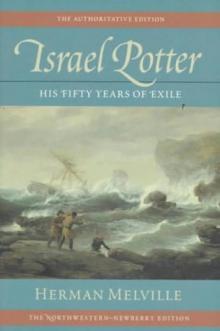 Israel Potter. Fifty Years of Exile
Israel Potter. Fifty Years of Exile